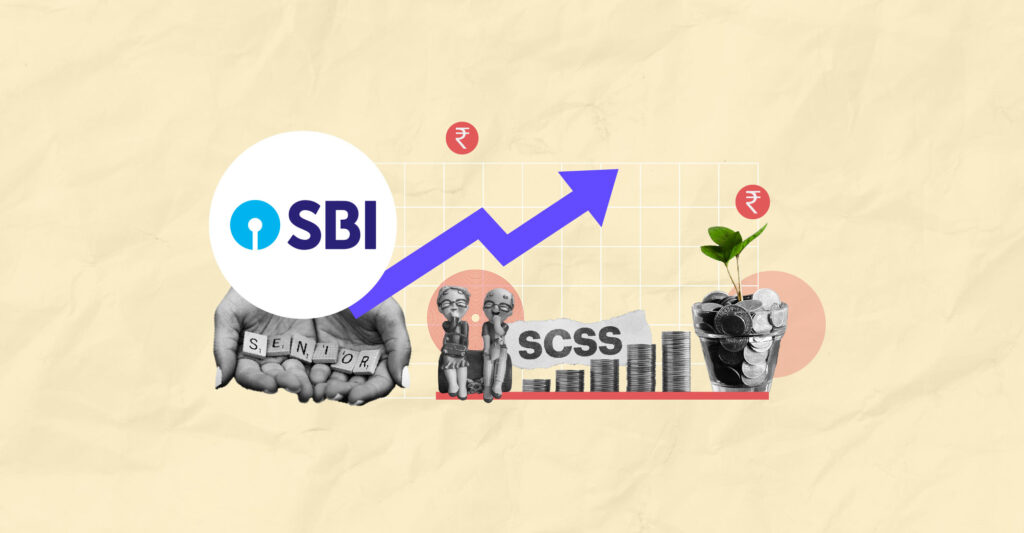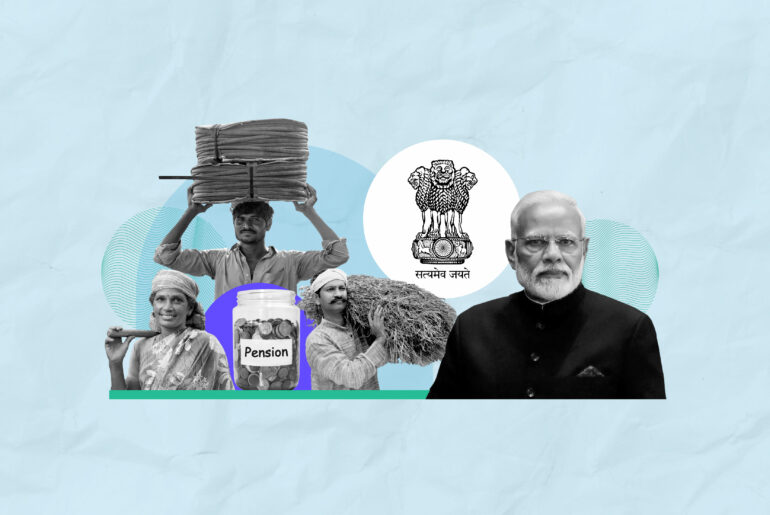Last Updated on Aug 24, 2022 by
Financial security is essential for everyone, especially for the retired or individuals close to retirement. They usually park their funds in the safest investment options like FD or savings schemes. There are savings schemes exclusively designed for senior citizens in this regard. One of the well-known schemes is the Senior Citizens Saving Scheme at SBI (State Bank of India). In this article, read about SBI Senior Citizen Savings Scheme with the interest rate offered, taxation, and the application process.
Table of Contents
What is SCSS?
Senior Citizens Saving Scheme (SCSS) is a government-backed scheme designed for retired individuals who want to generate income through safe investment. Retirees can open an individual or joint account with their spouse. It is provided at banks or post offices in India.
SBI SCSS interest rate
The interest rate on SCSS is revised by the Government of India every quarter. The same rate of interest applies to SCSS accounts regardless of the bank or institution with whom you have opened an account. Likewise, the current interest rate on the SCSS in SBI for Q2 FY 2022-2023 is 7.4% per annum.
Features of Senior Citizens Saving Scheme at SBI
- The minimum deposit for the scheme is Rs. 1,000, and the maximum deposit can’t exceed Rs. 15 lakh.
- The maturity period is 5 yrs and can be extended to another 3 yrs.
- In the case of joint accounts, only the first account holder will get the entire amount.
- The contributors can add more than one nominee to the account.
- The deposit made is paid at the time of maturity.
Taxation on SCSS
- The returns earned from the SCSS SBI are tax exempted under Section 80C of the IT Act, 1961.
- The interest earned on the scheme will attract TDS (Tax Deducted at Source) only if it’s more than Rs. 10,000 per annum.
Advantages of Senior Citizens Saving Scheme at SBI
Apart from the attractive interest rates on the SCSS, there are a few other benefits, like
- Aa quarterly income is provided in the form of interest payout for the account holders to meet their regular expenses.
- Once the account holder opens the account, the interest rate during that quarter remains the same till the end of the tenure.
- The account holders can extend the investment period after 5 yrs.
- The account holder can close the account after one year of opening it. However, there is no interest offered in this case.
- An eligible individual is allowed to open more than one SCSS account. However, the deposits in all the accounts should not exceed Rs. 15 lakh.
Disadvantages of SBI Senior Citizen Savings Scheme
Though the SBI SCSS offers a good set of benefits for senior citizens, it has certain limitations:
- It comes with an investment limit of Rs. 15 lakh per account holder.
- If the account is closed within 2 yrs of account opening, 1.5% of the deposited amount is levied as a penalty.
- If the account is closed after the first 2 yrs and before maturity, 1% of the deposited amount is charged as a penalty.
- If the interest earned is more than Rs. 10,000 in a financial year, then TDS is applicable.
Eligibility for SBI SCSS
You must meet one of the following eligibility criteria to apply for SBI SBSS:
- The applicant must be aged 60 yrs or above.
- The applicant who is below 60 yrs but above 55 yrs and retired on superannuation.
- Defence Services retired personnel of 50 yrs are eligible.
Note that Hindu undivided families and NRIs are not eligible for SCSS.
Documents required for SBI SCSS
The following self-attested documents are required for opening the SCSS in SBI:
- Duly filled Form A
- Identity proofs like PAN card or passport
- Address proofs like Aadhaar card
- Voter ID or birth certificate
- Passport size photographs of the applicant
How to open an SCSS account in SBI?
The Senior Citizen Savings Scheme account can be opened at any SBI branch. You need to fill the Form A, which contains the nominee, depositor and basic details of the applicant. Submit the duly filled Form A along with the documents and the deposit amount.
SBI Senior Citizens Saving Scheme vs Fixed Deposits (FD)
SBI also offers a fixed deposit account, SBI WeCare, which is different from the SCSS.
| Features | SBI SCSS | SBI WeCare (FD) |
| Interest rate | 7.4% | 6.5% |
| Tenure | 5 yrs (can be extended to 3 yrs) | 5-10 yrs |
| Eligibility | Individuals above 60 yrs | Resident senior citizens who are above 60 yrs |
| Taxation | Tax benefits under Section 80C of IT Act, 1961 | – |
FAQs
1. What is the SCSS Post Office interest rate?
Irrespective of where you open the account, the Senior Citizens Saving Scheme interest rate is the same everywhere. The Government of India decides it. The interest rate on SCSS at the post office is 7.4% per annum for July – September of FY 2022 – 2023.
2. How to open an SCSS account in SBI online?
Senior Citizens Saving Scheme can be opened at any bank or post office in India. As of now, you cannot open an account online.
3. What happens to the SCSS account in the case of a depositor’s death before maturity?
In the case of a depositor’s death before maturity, the Senior Citizens Saving Scheme will be closed. The account balance is paid to the nominee. The accumulated amount is provided to the legal heir if no nominee is provided.
4. What is the mode of deposit in the SCSS account?
SBI’s Senior Citizens Saving Scheme deposits can be made in cash, cheque or demand draft. However, cash deposits are allowed if the deposit amount is less than Rs. 1 lakh.
5. Can we make multiple withdrawals on the SCSS account?
No. SBI’s SCSS account does not allow multiple withdrawals for the account holders.
6. Is the interest provided if the SBI SCSS is closed within 1 yr of opening?
No interest is provided if the Senior Citizens Saving Scheme in SBI is closed within 1 yr of opening. If any interest is paid already, it will be deducted from the principal amount before closure.
7. What is the SCSS interest rate in SBI?
The interest rate on the Senior Citizens Saving Scheme in SBI is 7.4% per annum for Q2 FY 2022-2023. It is changed every quarter by the government.
8. What is the age requirement for the second applicant in the case of a joint account for SCSS?
In the SCSS joint accounts, though the age requirement for the main applicant is 60 yrs or above, there is no age criterion for the second applicant.
9. Where can I get the SBI Senior Citizens Saving Scheme form?
Form A is the application form for SBI Senior Citizens Saving Scheme. You can get the form at any SBI branch in India or download it here.
- Best Mutual Funds for Passive Investors (2025) - Dec 9, 2024
- List of Stocks With RSI Below 30 in India - Dec 9, 2024
- 10 Highest Dividend Paying Stocks in Nifty 50 NSE India - Dec 9, 2024




